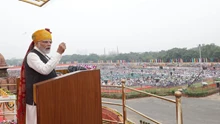
The Ministry of Environment, Water, and Agriculture has recently assessed the Liquid Fuel Displacement Program (LFDP) and the use of the electric grid as an alternative to power machinery and equipment used in farming.
The LFDP has set the ambitious goal of displacing over 1 million barrels of liquid fuels per day across utilities, industry, and agriculture by 2030. This comprehensive program involves the collaboration of more than 10 government entities and 20 private companies.
During a workshop organized by the ministry, Mohammed Al-Abdullatif, the head of the agricultural team of the program, emphasized the program's focus on replacing existing energy sources in agriculture with electricity through connections to the power grid. Al-Abdullatif explained that the LFDP not only aims to reduce liquid fuel consumption but also aims to enhance the operational capacity of the agricultural sector while minimizing external factors that could impact the sustainability of the Kingdom's environmental sectors.
Additionally, the program supports farmers by covering the costs of delivering electrical service to the farm gate and providing soft loans for necessary modifications to achieve sustainability and improve overall agricultural yield in the Kingdom.
To facilitate the program's implementation, farmers are required to provide data on the electric load necessary for their farms and estimate the time needed to transition to electricity. The rollout of the program will begin with major agricultural companies, followed by large-scale farmers, and eventually targeting smaller farms.
Saudi Arabia has already achieved significant milestones in the agriculture sector. In April, the Ministry of Environment, Water, and Agriculture announced that the country had achieved 60 percent self-sufficiency in mango production.
Furthermore, the ministry recently disclosed that the Kingdom has reached an impressive 95 percent self-sufficiency in papaya production. These achievements have motivated the ministry to further strengthen the agriculture sector by increasing the production of various vegetables and fruits. The ministry's focus is not solely on increasing quantity but also on improving the efficiency, quality, and safety standards of locally produced fruits, particularly during their respective production seasons.
By promoting sustainable practices and leveraging the power of electricity, Saudi Arabia is making significant progress in transforming its agriculture sector and ensuring a more sustainable and self-sufficient future for the Kingdom.









